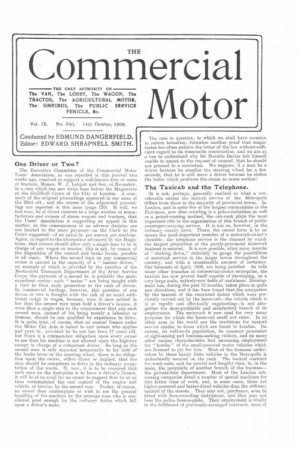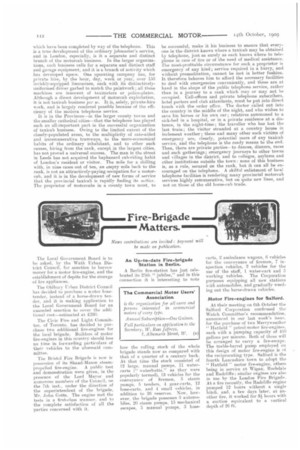One Driver or Two ?
Page 1

Page 2

If you've noticed an error in this article please click here to report it so we can fix it.
The Executive Committee of the Commercial Motor Users' Association, as was reported in this journal two weeks ago, resolved to support a well-known, firm of users of tractors, Messrs. W..1. Lobjoit and Son, of Hounslow, in a case which has now twice been before the Magistrate at the Guildhall Court of the City of London. A summary of the original proceedings appeared in our issue of the 23rd ult., and the course of the adjourned proceedings are reported in this issue (page 120). It will, we feel sure, be of direct interest to a large number of manufacturers and owners of steam wagons and tractors, that the Users' Association is supporting an appeal in this matter, as the consequences of an adverse decision are not limited to the mere payment—as the Clerk to the Court suggested—of an extra a. per annum per machine. Again, in regard to the alternative advanced by the Magistrate, that owners should allow only a single man to be in charge of any wagon or tractor, this is not, by reason of the disposition of the control and brake levers, possible in all cases. Where the second man on any commercial motor is carried in the capacity of a "learner driver," an example of which is provided by the practice of the Mechanical Transport Department of the Army Service Corps, the payment of a second 5s. is probably the mostexpedient course: such " mates" are being taught with a view to their early promotion to the rank of driver. In commercial haulage, however, this question of one driver or two is fraught with the risk of no small additional onto in wages, because, were it once settled in law that the second man must hold a driver's licence, it were then a single step to the requirement that any such second man, instead of his being merely a labourer or fireman, should be one qualified by experience to drive. It is quite true, of course, that an annual licence under the Motor Car Acts is issued to any person who applies and pays 5s., provided he be not less than 17 years old, but there is a eommon-law obligation upon every owner to see that his machine is not allowed upon the highway except in charge of a competent driver. So long as the second man is only expected temporarily to lay hold of the brake lever or the steering wheel, there is no obligation upon the owner, either direct or implied, that the man should be competent to drive in the ordinary acceptation of the words. If, now, it is to be required that each man on the foot-plate is to have a. driver's licence, it will be of no avail for an owner to suggest that be at no time contemplated the real control of the engine and vehicle, or tractor, by the second man. To-day, of course, no owner does contemplate or wish to see the general handling of the machine by the average man who is considered good enough for the ordinary duties which fall upon a driver's mate.
The case in question, to which we shall have occasion to return hereafter, furnishes another proof that magistrates too often enforce the letter of the law without sufficient regard to its reasonable construction, and we are at a loss to understand why Sir Horatio Davies felt himself unable to assent to the request of counsel, that he should not proceed to a conviction. We suppose, if a man be a driver because he steadies the steering wheel for a few seconds, that he is still more a driver because he stokes the boiler which produces the steam to cause motion!
The Taxicab and the Telephone.
It is not, perhaps, generally realised to what a conr-iderable extent the taxicab service of the Metropolis differs from those in the majority of provincial towns. In London, and in some few of the largest communities in the Provinces, now that crawling is a police-forbidden as well as a petrol-wasting method, the cab-rank plays the most important role in the organisation of this branch of public passenger-carrying service. It is not so, however, in the ordinary county town. There, the emus] hirer is by no means the most-important member of a motorcab-owner's clientele: the telephone service is the channel by cinch the largest proportion of the purely-provincial motorcab business is secured. It is now possible, after many months of " shaking down," definitely to gauge the possibilities of motorcab service in the larger towns throughout the country, and with a considerable amount of certainty. Our forecasts of April, 1908, are being justified. As with many other branches of commercial-motor enterprise, the taxicab has now proved itself capable of developing, on a r.ery large scale, entirely-new fields of usefulness. Development has, during the past 12 months, taken place in quite new directions, and it has been found that the usurpation by the taxicab of the restricted duties which were previously carried out by the horse-cab—the vehicle which it is so rapidly and effectually supplanting—is not altogether the most-profitable and satisfactory branch of its employment. The motorcab is now used for very many purposes for which the horse-cab could not cater. In no other area in the world are the conditions for taxicab service similar to those which are found in London. Its extent, its well-to-do population, its constant procession of sight-seeing and business-seeking visitors, and its many other unique characteristics find increasing employment for " hordes " of the small-powered motor vehicles which are licensed to ply for hire. Most of the business under., taken by these handy little vehicles in the Metropolis is undoubtedly secured on the rank. The booked contract for week-ends, and for special and lengthy rims, is, in the main, the perquisite of another branch of the business— the private-hire department. Most of the London cabowning companies detail a number of special machines for this latter class of work, and, in some cases, these are higher-powered and better-fitted vehicles than the ordinary taxicab of the streets. They may not, perchance, even be fitted with fare-recording instrument, and they may not bear the police licence-plate. Their employment is wholly in the fulfilment of previously-arranged contracts, most of -which have been completed by way of the telephone. This is a true development of the ordinary johmaster's service, -and in London, especially, is it a separate and distinct branch of the motorcab business. In the larger organizations, such business calls for a separate and distinct staff and garage equipment, and it is a branch of activity which has developed apace. One operating company has, for private hire, by the hour, day, week or year, over 150 lavishly-equipped limousines, each with its distinctivelyuniformed driver garbed to match the paintwork ; all these machines are innocent of taximeters or police-plates. Although a direct development of motorcab exploitation, it is not taxicab business per se. It is, solely, private-hire work, and is largely rendered possible because of the efficiency of the modern telephone service. It is in the Provinces—in the larger county towns and the smaller cathedral cities—that the telephone has played such an all-important part in the successful organization of taxicab business. Owing to the limited extent of the closely-populated areas, to the multiplicity of rate-aided and unremunerative tramways, to the more-economical habits of the ordinary inhabitant, and to other such causes, hiring from the rank, except in the largest cities, has not proved a universal success. The man in the street in Leeds has not acquired the haphazard cab-riding habit of London's resident or visitor. The mile for a shilling with, in nine cases out of ten, an empty mile back to the rank, is not an attractively-paying occupation for a motorcab, and it is in the development of new forms of service that the provincial taxicab is rapidly finding its unifier. The proprietor of motorcabs in a county town must, to be successful, make it his business to ensure that everyone in the district knows where a taxicab may be obtained by telephone, just as surely as each knows where to telephone in case of fire or of the need of medical assistance. The most-profitable circumstance for such a proprietor is emergency of any kind; service required in a hurry, and without premeditation, cannot be met. in better fashion. It therefore behoves him to afford the necessary facilities to deal with emergencies conveniently, and these are at hand in the shape of the public telephone service, rather than in a journey to a rank which may or may not be occupied. Call-offices and private telephone subscribers, hotel porters and club attendants, must be put into direct touch with the order office. The doctor called out into the country in the middle of the night, and who wishes to save his horses or his own car; relatives summoned to a sick-bed in a hospital, or in a private residence at a distance, in the night-time ; the traveller who has lost the last train; the visitor stranded at a country house in inclement weather ; these and many other such victims of emergency are, clearly, potential users of any taxicab service, and the telephone is the ready means to the end. Then, there are private parties--to dances, dinners, races and such gatherings; emergency journeys to other towns and villages in the district, and to colleges, asylums and other institutions outside the town: none of this business is, as a rule, secured on the rank, but it can all be encouraged on the telephone. A skilful enlistment of local telephone facilities is rendering many provincial motorcab services highly remunerative, but on quite new lines, and not on those of the old horse-cab trade.




















